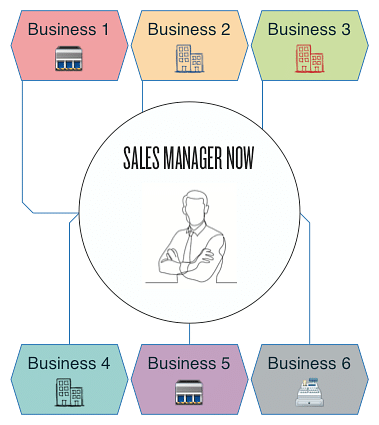
What is fractional sales management? Rene Zamora shares how fractional sales can grow your business
By Jim James, Founder EASTWEST PR and Host of The UnNoticed Entrepreneur.
Rene Zamora has been running his business, Sales Manager Now, since 2006. Joining me from Sacramento, California, he talked about fractional sales management and how he helps business owners to make sales in the new episode of The UnNoticed Entrepreneur.
Image from LinkedIn
What’s Fractional Sales Management and Its Perks?
Rene helps clients make sales by getting in there and leading their sales teams. He named his company Sales Manager Now because that's what they are: They understand how to manage and lead sales teams. And what he noticed is that people in this industry often go unnoticed because they don’t know about fractional sales management.
Rene and his team are very experienced senior managers who understand systems, processes, meetings, managing people, strategic planning, niches, marketing, and aligning all of these. They bring these into a small business — but not just one business. They fraction out their time and skills. They work with three to seven businesses and sales teams at one time.
And the benefit for the small business is that they only pay them a fraction of their total fees and they still get the experience that they don’t usually attract. Rene used the word “attract” because most small businesses don't have a challenging and attractive enough job for one senior sales leader to come in and work full time.
By splitting things up, it becomes a little more challenging for Rene and his team — and they also get to have fun in the process.
Image from Sales Manager Now
As a company grows, one needs a sales director to get across the hurdle. And many business owners come to them when they’re hitting a ceiling or running up against the wall.
For instance, you've just grown your business to a point where you've had good momentum — you've got to this place — but then you set your next goal and it seems like getting to that next-level goal isn't happening. And you might have different reasons. We lost a person. This happened. But the bottom line is that business owners like you need that extra energy.
Many clients who have come to them are the ones who have tried different approaches. They've tried to hire that leader, they've tried to bring in another manager, and they've tried to promote a salesperson to a manager. They've changed the team. And they’ve realised they can't find the answer on their own. Their clients are usually people who are seeking a new answer. And Rene considers themselves fortunate that they’re solving problems — the small business sales dilemma — for them.
On Confidentiality and Integrity
If you’re a business owner, one of the concerns that you have is confidentiality. To avoid potential conflicts of interest, Rene shared that they need to sign a non-disclosure agreement (NDA). They do all the legal things properly.
The interesting thing about his business is that when this business discovered him (as he’d like to put it), he almost felt like he wasn’t the founder. Rather, he was the one found.
He also initially thought that he was going to be working in a specific niche: “I’m working in telecom right now. I'll just go find all the telecom companies and work with them and make it easy.” But it just hasn't worked out that way because many other clients have found them through their website.
They were noticed organically and through referrals as well. Now, they have been in over 25 different industries — and he has not worked in all those industries. What makes things easy for them is that they aren't just taking trade seekers from one and passing them on to another. They earned integrity with their clients and there hasn't been a concern.
Professionalising a Sales Team
The question now is, how do they help business owners set up sales and professionalise their sales team?
For Rene, expectations is number one. Everyone wants an accountable environment, but you can't have any accountability if you don't have clear expectations that are understood and agreed upon.
He could give a business owner a goal — for the month or even for the year. For instance, he’d say, “We have five salespeople. We need each of you to reach this for us to reach this. This is your job.”
However, it's not just about the goal anymore. A goal is good to get. But now, it’s about transferring that expectation (which is more than a number and a goal) to the actual ownership of each salesperson’s contribution to the business’ total success. This is the place where they should be coming from and they have to have that understanding in order to transfer it to someone.
Many business owners believe that they're already transferring that when they've given their salespeople a goal. In reality, they haven't, because ownership and accountability should follow.
Image from Unsplash
So the first thing is expectations. The next one is monitoring sales meetings and how people are doing.
The next one is allowing people to solve their problems. “Okay, you're off track. What are you going to do about it?” This is about letting people solve their own problems — you support and encourage them as they need but they still have to take ownership of it. It’s also about celebrating what's working and fixing what's not.
These are rather simple things. But when he says expectations, for instance, there are a lot of details related to it. It’s what most people call a "sales playbook," which includes your job description, your compensation, your sales process, your customer relationship management (CRM), and your target market (which prospects are qualified to talk to and which are not). These are details and fundamentals that need to be in place.
The Significance of Reputation
A reputation can help a sales team get leads and close deals. And according to Rene, a good reputation allows a salesperson to come in and have a sort of an introduction before they even begin a conversation.
When he started his consulting business, one simple thing he did was to send a little postcard to people he was going to do a phone call on. When he called them, he never asked about the postcard. After all, he only considers it minor marketing. But then, there were people who brought up receiving that card. And he used that to continue their conversation. He’d say, “Yes, that was me who sent it.” Now, they’re in a conversation about something that they recognise.
It’s a simple example of trying to influence that initial sales conversation by building a reputation and a brand. Building all this alters the buyer's mind and how they listen to and converse with you.
On Aligning Sales and Marketing Teams
When you go into a company, the brand (and the brand promise) and the product offering are often different. However, business owners must ensure that the sales team are aligned with what the marketing team is doing.
Image from Unsplash
Rene shared that the larger the company, the more that they’re out of alignment. It's going to be egos. So how do he and his team address it?
The first thing that came to his mind is that they communicate. Keeping on communicating is the key. It's about asking questions and seeking understanding. If you don't understand, ask another question. It's being transparent about what's working and not working from a sales perspective.
He often shares this with business owners: Sometimes people will shut down salespeople's feedback because they're very loud, they exaggerate, and they dramatise. But all this happens because salespeople are trying to be heard. It just means that they have something that needs to be heard. And they need to know that someone is going to do something — and does something — about it.
With sales and marketing, you need a leader that can facilitate that conversation to make sure that both parties are heard; that both parties understand each other and their role in achieving the overall company goal. One isn't better, you need them both.
It’s also about understanding what’s possible and what’s not possible. You can't do every idea.
You’ll see that once you start talking in a business framework and you have a leader who can facilitate that, the exaggeration and the dramas go down. Because, now, people know that they could just bring their feedback to the table and others will hear it. They will talk about it and they will solve it or they won’t solve it.
It's not that difficult, but someone has to want to listen.
On Incentives, Motivations, and Transparency
Typically, sales and marketing people receive different incentives. The former may get a commission while the latter may only receive a voucher for pizza or something like that.
Rene shared that when they go into a company, they evaluate compensation all the time. But he’s never tried to make everything equal. There are different roles. There's definitely a risk in some sales roles and there's not so much risk in other sales roles, so they’re usually compensated less.
When it comes to getting everyone's effort aligned towards striving for more, he shared that he always encourages owners to try an all-employee bonus.
This is something that he’s already done before. When he was at CellularOne, they measured three metrics quarterly. And every employee will have the same amount of bonus — whether they’re a manager or the lowest hourly-rate employee. They gave the same amount of bonus because all of their jobs impacted those three key performance indicators (KPIs). And this is just one way to pull people together without adjusting every salary because every role has to be competitive in the marketplace.
Those KPIs include new customers churn. They could lose so many customers and they could gain so many customers. Then there’s EBITDA (earnings before interest, taxes, depreciation, and amortisation), the bottom line, the profit. And the company was willing to share what that was. And that kind of motivated how they spent and how they worked over time. Everyone knew that and so they worked serving customers, finding new customers, and keeping the bottom line healthy.
Image from Unsplash
That strategy touches on transparency. And when asked about sharing mission-critical information with an entire team, Rene said that you should share as much as you’re comfortable. After all, if you're not comfortable, it won't come across. Therefore, you have to find your own comfort in it.
Many small business owners don't want to show their finances because they're afraid everyone's going to think that's what's going in their pocket. And that's just a trust issue they got to deal with. But Rene learned early on from some smart folks that sharing more business information with people is a form of empowering them. If you're more transparent with more financials (not just a spreadsheet of a bunch of information), then they can better understand and do something with it.
It also tells your employee, “Oh, I'm entrusted with this.” At that point, you're making them a little bit of a partner. Sharing more business information that is useful for someone is what Rene found to work very well. This is also the same ethos behind Ricardo Semler’s Semler Industries in Latin America and what I use as well with my firm.
How Sales Manager Now Came to Be
Earlier, Rene said that he was the one found by his business. Back then, he was at a crossroads and he was seeking direction in his life as a consultant. His background was in sales, but he was doing high-performance leadership and team training. It was satisfying to a point that he had lost that team element — that “winning together” element.
He didn’t know that he was looking for something else. And after about six months of praying (he’s also very grounded spiritually and he’s always looked for a higher direction), he met with a person and that person said, “Why don't just become a small sales manager for small businesses?” And he felt like bright lights came on. I’m doing that.
That person’s husband gave him his company name that night. The following day, he owned it and he got a domain for it. He told his other friend who knew about his situation and that friend said, “I think they know who your first client will be.” A week later, that friend became his first client. And that particular salesperson he worked with is now the Chief Executive Officer of that business. Sixteen years later, Rene still does some work for them.
On Getting Noticed
Rene said that he has never wanted clients. And in the consulting world, this is very unique to say. Because at the time when he was starting, he was a bit overwhelmed. But now, he’s growing and scaling his business. It’s challenging and it requires more marketing and more public relations (He mentioned that he also enjoys being invited as a guest on podcasts to get more noticed).
Rene has also published a book called “Part-Time Sales Management.” And it has been a useful investment for him. He wrote that because he believes he has something to share that might help someone. And it has indeed helped someone, because they’ve gotten some more clients through the book. But when he was writing it, his expectations were low. It was kind of a passion project and something that he’s always wanted to complete.
Image from Sales Manager Now
In relation to that, he said that if you have something that needs to get done and it's important, get it done before you start three more things.
When he said that he was going to write the book, there was no doubt that he would. It took him five years but he didn't care — it was going to be done. He also said that he was going to do 52 videos to help people learn more about sales leadership tips. When he was at the 47th video, he had five more to do and they got done.
These examples only show that you have to finish; you have to implement. You can't just keep coming up with ideas, because that is an entrepreneurial trap.
To find out more about Rene and Sales Manager Now — and if you're looking for a Fractional Sales Manager and don't want to overpay but get the best — visit www.salesmanagernow.com. You can also get his “Part-Time Sales Management” book on Amazon.
This article is based on a transcript from my podcast The UnNoticed Entrepreneur, you can listen here.
Cover image by Freepik







